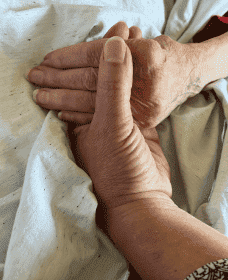Understanding Hospice Care: Is it Too Early to Start Hospice?
Published on August 7, 2023
Updated on April 28, 2024
Published on August 7, 2023
Updated on April 28, 2024

Table of Contents

As you face the difficult journey of having a loved one with a terminal illness, you may be wondering if it’s too early to consider hospice care. Hospice is a compassionate and supportive approach to end-of-life care, and it’s essential to understand the benefits it can bring to the patient and the family.
Most of the time, when a patient or family member asks the good question, “Is it too early to start hospice?” They may believe the patient has longer than six months to live. They may be wondering if the very word “hospice” may remove any hope the patient has about living a longer life.
I’m very biased on the answer to the question as an experienced registered nurse specializing in providing comfort and compassion to those with a terminal illness. My answer is that it is never too early if the patient is terminal. Every one of us is different; what medications work for comfort for one person may not work for another, and just because someone may have “no known drug allergies” (NKA) doesn’t mean they have no drug allergies (there’s the unknown, the untried). Sometimes, the best choice is a non-pharmaceutical, but to pick the best, you must know the person. I love getting to know my patients and finding their preferences for what works for them for comfort. After all, patient-centered care requires the patient to be involved. When we get patients who are dying upon admission, all eyes are on the hospice workers to provide miracles (of sorts) in terms of comfort, and that’s not how it works best. Let me go over some basics.
Hospice care is a way of caring for people with serious illnesses that cannot be cured. Hospice care helps these people feel more comfortable, less pain, and more peaceful in their last days. Hospice care also helps their families cope with the loss of their loved ones. Hospice care does not try to make people die sooner or later but to let them live as well as they can until they die naturally. Hospice care is given by a team trained to help with different aspects of the patient’s and family’s needs. The hospice team includes doctors, nurses, social workers, counselors, and volunteers. They work together to give the best care possible to the patient and their family.
Hospice is a philosophy and a service, not a location. Hospice services can be provided wherever the patient lives as long as the patient qualifies for hospice.
Hospice care is for people who are very sick and cannot get better. Hospice care helps them live the rest of their lives with less suffering and more dignity. Hospice care can be started when the doctor says that the person has only six months or less to live if the sickness does not change. Hospice care is not only for people who have cancer but also for people who have other kinds of serious illnesses.
Hospice care offers numerous benefits for both the patient and their family. Some of these benefits include:
It’s crucial to remember that hospice care is about improving the quality of life for the patient and their family, regardless of the time left. Hospice care can be initiated when the patient’s condition is declining and they require comfort-focused care rather than life-prolonging treatments. Starting hospice care early can provide ample time for the patient and their family to benefit from the support and services offered.
If unsure when to consider hospice care, consult the patient’s primary physician or a hospice care provider. They can guide you through the process and help you make an informed decision based on the patient’s needs and circumstances.
Why Hospice Care Could Benefit Your Loved One Sooner Than You Think
What’s the process of getting your loved one on hospice service?
Picking a hospice agency to provide hospice services
Pennsylvania Department of Health – Hospice FAQ
Hospice Care | How is Hospice Care Provided and Paid For?
CaringInfo – Caregiver support and much more!
Surviving Caregiving with Dignity, Love, and Kindness
Caregivers.com | Simplifying the Search for In-Home Care
As an Amazon Associate, I earn from qualifying purchases. The amount generated from these “qualifying purchases” helps to maintain this site.
Take Back Your Life: A Caregiver’s Guide to Finding Freedom in the Midst of Overwhelm
The Conscious Caregiver: A Mindful Approach to Caring for Your Loved One Without Losing Yourself
Everything Happens for a Reason: And Other Lies I’ve Loved
Final Gifts: Understanding the Special Awareness, Needs, and Communications of the Dying
Providing Comfort During the Last Days of Life with Barbara Karnes RN (YouTube Video)
Preparing the patient, family, and caregivers for a “Good Death.”
Velocity of Changes in Condition as an Indicator of Approaching Death (often helpful to answer how soon? or when?)
The Dying Process and the End of Life
As an Amazon Associate, I earn from qualifying purchases. The amount generated from these “qualifying purchases” helps to maintain this site.
Gone from My Sight: The Dying Experience
The Eleventh Hour: A Caring Guideline for the Hours to Minutes Before Death